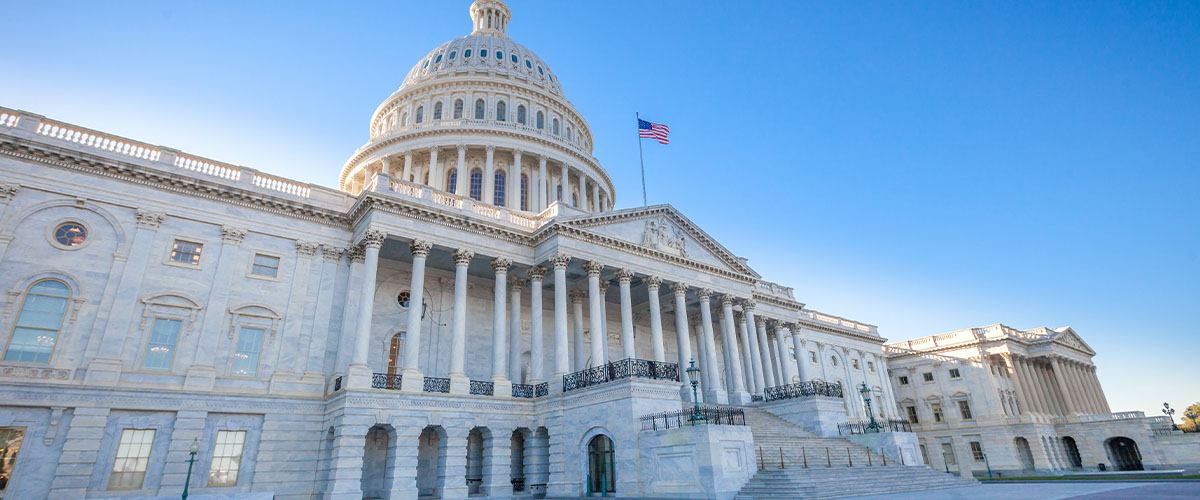Donald Trump indicated he would support a previous version of the legislation last year.
A bipartisan group of lawmakers in the United States House and Senate reintroduced landmark legislation last week to give states license to legalize marijuana as they best see fit. The Strengthening the Tenth Amendment Through Entrusting States (STATES) Act of 2019 amends the Controlled Substances Act to forbid federal law enforcement agencies from enforcing prohibition.
Reps. Earl Blumenauer (D-OR) and David Joyce (R-OH) introduced the STATES Act last Thursday, announcing their filing with a press conference alongside cosponsors Reps. Barbara Lee (D-CA) and Joe Neguse (D-CO). Sens. Cory Gardner (R-CO) and Elizabeth Warren (D-MA) joined them in the Senate.
“Forty-seven states have legalized some form of cannabis and the majority of Americans support its legalization,” Blumenauer said in a statement. “Our outdated laws have ruined lives, devastated communities, and wasted resources for critical medical treatment and research. The STATES Act is the next logical step in a comprehensive blueprint for more rational federal cannabis policy.”
“It’s time for Congress to catch up with the rest of America and fix a badly broken system,” he added.
Today, I introduced the STATES Act w/ @RepDaveJoyce @SenCoryGardner @SenWarren. Our outdated cannabis laws have ruined lives, devastated communities and wasted resources. This is the next logical step for Congress to catch up w/ the rest of America & fix a badly broken system. pic.twitter.com/YUW3iqwu25
— Earl Blumenauer (@repblumenauer) April 4, 2019
While a majority of states have legalized cannabis in some capacity, it remains prohibited federally under the Controlled Substances Act. Marijuana is classified as a Schedule I substance under that law, a category reserved for substances with “no currently accepted medical use” in treatment and “a high potential for abuse.”
Rather than legalize marijuana across the board, the STATES Act would allow each state and territory to decide their own marijuana policy. It would block the federal government from punishing people for actions in compliance with state cannabis laws.
“Our federal marijuana laws are outdated and pose a threat to our public health and safety. Marijuana should be legalized and we reverse the harm of these failed policies by wiping clean the records of those unjustly jailed for minor marijuana crimes,” said Warren, a Democratic candidate running for president hoping to challenge Donald Trump in 2020.
“Congress should take immediate action on these important issues by passing the bipartisan STATES Act and protecting states, territories, and tribal nations as they implement their own marijuana laws without federal interference,” she added.
Likelihood of the STATES Act Passing
With support for marijuana at an all-time high, top cannabis-advocating lawmakers believe the STATES Act has a chance of becoming law this year. The chairman of the House Committee on Rules last month suggested his panel could take up cannabis reform legislation “within the next several weeks.”
The hiccup could come from the Republican-controlled Senate, where Senate Majority Leader Mitch McConnell has not indicated he’s interested in passing any significant reforms this year, particularly since he pushed for the legalization of hemp last year.
Still, growing support for ending prohibition among federal lawmakers is a good sign for the future of the STATES Act. Like the previous version, the new STATES Act has strong support from lawmakers on both sides of the aisle. Overall, there are 26 initial cosponsors on the House Version of the latest version of the bill. In the Senate, 10 lawmakers initially backed the bill. More are expected to sign on.
“If this gets moving, I think you will see the Senate get on board,” Blumenauer told Rolling Stone. “I think Mitch McConnell is not going to want to have his members be vulnerable.”
That’s why I introduced the bipartisan, bicameral STATES Act with @SenWarren, @RepDaveJoyce, and @repblumenauer. This is a mainstream, federalism approach to a conflict that must be resolved.
— Cory Gardner (@SenCoryGardner) April 4, 2019
Rep. Doug Collins (R-GA), the U.S. House’s top Republican in the House Judiciary Committee, urged the new Democratic majority last week to take up and pass the legislation. Collins pushed for the bill in a letter to the panel’s chairman, Rep. Jerrold Nadler (D-NY).
“More than 30 states and the District of Columbia have legalized the medicinal and/or recreational use of cannabis. Other states have opted to decriminalize cannabis possession, or to legalize the consumption of certain cannabis-derived extracts. Some states still prohibit cannabis use of any kind,” Collins wrote. “Given that the substance is still a Schedule I drug under federal law, this conflicting patchwork of state and federal laws has created a unique set of legal challenges.”
Plus, the STATES Act could have the backing of the president. When the previous version of the STATES Act was introduced in the 115th Congress last year, Donald Trump said he would “probably” support it if Congress passed it.
Ongoing Cannabis Coverage
House Democrats are pushing for a series of cannabis reform bills to address the discrepancy between federal marijuana prohibition and states that have legalized cannabis. Other legislation under consideration includes bills to secure banking access for businesses in the cannabis industry and the study of marijuana benefits for veterans.
Regularly check back on the Medical Marijuana, Inc. news page or follow us on our Facebook and Twitter accounts to keep up with the latest cannabis industry developments.






